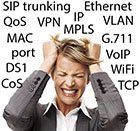Net neutrality: a religious issue?
When something is referred to as a "religious issue" in the technical world, that means people tend to take a side on the issue then defend it tooth and nail, even to the point of irrationality. Calling themselves the "good guys" and the other side the "bad guys" as if they have moral high ground, ignoring the other side's legitimate arguments, vilifying their opponents and engaging in personal attacks. Mac vs. PC is an example. It appears that "net neutrality" is another.
As you may have noticed, the "net neutrality" argument bubbled back up to the top of the news feeds recently after various events involving the FCC, CRTC and John McCain.
I agree with some of the things net neutrality advocates want the government to make illegal, for example giving one search engine's traffic higher priority than another when there is no technical reason for doing so - without disclosing it is happening.
However, I am very much against poorly-thought-out laws that will have all manner of unintended consequences like dramatically raising the cost of internet access, dramatically lowering the speeds experienced by normal folks doing web surfing and email, supporting thieves stealing copyrighted material, and restricting the freedom of businesses to determine the terms of private contracts for peering, just to give a few examples.
And as far as I can tell, that would be right where we would be heading with the net neutrality activists' laws.
On October 23, PC Magazine published an online article / blog entry Net Neutrality Foes: What If The 'Bad Guys' Are Right?" suggesting "We need to listen and carefully consider both sides. Even if, frankly, it's hard to find a really good argument against Mom, apple pie, or net neutrality." Not exactly a neutral approach...
So I nibbled at the bait, and posted a comment with a link to my arguments against net neutrality. It's the third comment, from "ECNY" with a link to my blog.
Holy cow. Talk about a religious issue!Within a couple of hours there were dozens of comments on my blog entry ranging from incoherent ramblings to personal attacks to well-reasoned arguments that included personal attacks.
Here's the list of my blog articles on net neutrality:
Net Neutrality - Foolish, ignorant or disingenuous?
Net Neutrality II: If the power company allowed this, your electrical bill would double
Net neutrality - not. VideoTutorial on Service Level Agreements, traffic shaping and traffic policing
Is the Internet a Public Utility?
The comments and my responses to them are mostly under the first one.
Here are a couple of the typical comments and responses:
Jay on October 23rd, 2009 11:56 pm
[comment]
You said: "If "net neutrality" principles were applied to electricity, it would be like having no electricity meter."
My comment is: No. The antithesis of net neutrality applied to electricity would be like an electric company being able to tell what types of things you're powering, and be able to throttle your use of your videogames consoles so that everyone on the block can power their refrigerators.
If "net neutrality" principles were applied to electricity, it would be what we have right now. You pay based on how much you use, not what you use.
A pipe is just a pipe. I, and every other person paying for the same service in my area, should get N Mb/s, regardless of what I'm using. Period. If I paid for N Mb/s (perhaps with a transfer cap of M gigabytes of data per month), I should get N Mb/s until those M GB are reached.
I should be able to use that on mission critical business applications or on X-box Live. I already pay for my electricity which powers my X-box *and* my IBM Thinkpad. How you can *POSSIBLY* compare "net neutrality" with "no electricity" meter is the most absurd thing I have read recently.
[response from author]
The premise of the "no electricity meter" analogy is that there are a significant number of people in the "net neutrality" camp who are very much opposed to usage-based pricing or monthly download caps. If they have their way, there would be no transfer caps allowed, no meters.
"would be like an electric company being able to tell what types of things you're powering, and be able to throttle your use of your videogames consoles so that everyone on the block can power their refrigerators". That's not correct. It would be much more like the electric company throttling your use of 200 amps 24/7/365 for the halide lighting system for your basement marijuana grow-op so that everyone on the block can power their refrigerators. The thing that is being restricted is bandwidth-hogging bittorrent used for unlawful activity: stealing copyrighted content. Let's not pretend otherwise lest we forget the whole reason for the problem.
"A pipe is just a pipe". That's not correct. You are confusing access line speed with a service level agreement based on a traffic profile. The capacity to a network is designed based on statistical multiplexing, meaning that the internal capacity is less than the total of the access line speeds. How much less can be calculated knowing the historical demand statistics, i.e. how often people transmit packets at their access line speed, hence the term statistical multiplexing.
The internal network capacity is certainly not designed for people to transmit packets at their access line speed 24 hours a day which you seem to be suggesting by saying the service is just a pipe.
Since the internal network capacity is purposely designed to be less than the total of the access line speeds (lowering the cost to the users!), then there have to be mechanisms to ensure that the traffic experienced by the network is actually within the design parameters, the usage statistics.
The mechanism for that is to define a traffic profile and sell a service level agreement. The traffic profile specifies the "statistics": the maximum average number of bits per second, maximum number of bits per second, maximum burst size. The service level agreement is between the network and the user: if the user agrees to transmit at or below the traffic profile, the network agrees to guaranteed transmission characteristics like maximum delay, maximum number of dropped packets.
When you pay $50 per month for network service, you are not buying a "pipe" at your access line speed. You are buying a residential-user traffic profile, which is an agreement for considerably less than transmitting at your line speed 24 hours a day.
If you want a network service that is a "pipe", i.e. where you can transmit at your line speed 24 hours a day, that can certainly be purchased. But it wouldn't cost $50 a month. It would cost $500 to $1000 a month.
Complaining because you aren't getting a $500/month service for $50/month?
Last point: if we change your statement "perhaps with a transfer cap of M gigabytes of data per month" to "with a transfer cap of M gigabytes of data per month", that would fix part of the problem. But...
(a) There are many people in the "net neutrality" camp vehemently opposed to limits. They want to pass laws to force traffic profiles to be an unlimited "pipe", i.e. a $500/month service mandated for everyone.
(b) If monthly caps or limits continue to be legal, what happens if everyone tries to transmit and receive at their line speed starting at 00:01 on the first day of the month until they reach their cap a few days later... and they all do this at the same time... and it is illegal for the network to enforce traffic profiles?
It would be legally required that the network support everyone transmitting at full line speed. The network would have to be designed to allow everyone to transmit at line speed continuously at the same time, even if it were only used that way for a few days a month. The cost of the network would be 10 times higher. Cost of Internet service would have to jump from the current $50 per month to $500 per month to support it.
No thanks.
ankur on October 23rd, 2009 10:26 pm
[comment]
Hey Dude, why dont you go and read some basic facts about IP and such before blogging junk!
[response from author]
Does spending six years at University to get a Bachelor's degree in Electrical Engineering, then a Master's degree in Electrical Engineering, both specializing in communications count?
Does authoring BOOT CAMP count?
Think Again on October 24th, 2009 1:26 am
[comment]
Nonsense.
Net neutrality means people can get any content they want, and companies cant brainwash them with their "preferred channels".
[response from author]
If that was all that "net neutrality" advocates were trying to make illegal, I would agree with you. Unfortunately, they also want to make usage caps, traffic profiles and even the freedom to define terms of private service contracts between networks illegal too. No thanks.
[comment]
You must work for a big cable / telco. Remember if you are receiving any compensation from them, its now required by law that you as a blogger disclose that to your readers.
[response from author]
You assume that anyone who disagrees with you must work for a network service provider? If you did a bit of fact-checking, you would discover that I work for myself. My personal website is https://www.teracomtraining.com if you want to learn more about me.
No, I disagree with you because you and people like you want to pass very poorly-thought-out laws that in addition to all the noble things like preventing brainwashing and anti-competitive practices, would also have the effect of:
- dramatically raising the cost of Internet service for the populace,
- dramatically lowering network speeds for typical users doing web surfing and email, and
- curtailing the freedom of businesses to define the terms of private contracts, not to mention supporting thieves stealing copyrighted works using bittorrent.
Euchre on October 24th, 2009 1:46 pm
[comment]
To put the issue simply and counter the misrepresentation in this blog, the problem isn't that net neutrality won't allow things like QoS, it's that QoS will only be provided to what the ISP decides will get it. Basically the ISP's systems won't ask 'what kind of packet are you', it'll ask 'who is going to get this packet'. The former would be neutral and allow proper QoS, the latter would ignore real QoS and would be anti-competitive.
[response from author]
If that was all "net neutrality" meant, then I would almost* agree with you. However, the fact is, different advocates of net neutrality also want to variously make traffic profiles and caps illegal, traffic shaping and policing illegal, multiple service levels ("tiers") illegal, and even the freedom of businesses to define terms of private contracts illegal. These are very poorly thought-out ideas. They would lead to serious increases in the cost of internet service and serious reductions in service speeds. No thanks.
*The part where I would still disagree with you is related to the statement:
"the ISP's systems won't ask 'what kind of packet are you', it'll ask 'who is going to get this packet'. The former would be neutral and allow proper QoS, the latter would ignore real QoS and would be anti-competitive."
This is also related to the statements I've made along the lines of "want to make the freedom of businesses to define terms of private contracts illegal."
Here's the thing:
The Internet is a business. It is not implemented by the government and paid for by taxpayers. The internet is a collection of Autonomous Systems (ASs) that are interconnected. An Autonomous System is a group of interconnected routers that are controlled by the same organization. A university is an AS. An ISP is an AS. Google has an AS.
One method of interconnection between ASs is called "peering". This is where two ASs, for example, two ISPs, notice that they have fairly equal volumes of traffic going to and coming from each other's networks, that is, the rate of packets where the source IP address is on one ISP's AS and the destination IP address is on the other ISP's AS is equal to the rate of packets the other way around. So these two ISPs, even though they may be competitors, enter into a very confidential agreement to connect a router of ISP "A" to a router of ISP "B" and exchange packets. No money changes hands except for the cost to install and maintain the connection.
That's all fine.
It is in fact a fundamental part of the internet.
The problem happens a bit later. What happens if ISP "A" begins to transmit packets to ISP "B" over this peering link where the destination IP address is not on ISP "B"s network, but on ISP "C"s network.
In the absence of any discrimination based on source and destination, ISP "B" would be obliged to carry these packets from ISP "A" over its network and deliver them to ISP "C" somehow... at the expense of ISP "B".
Does that sound fair to you?
Would it not be fair for ISP "B" to verify that the destination IP address on the packet was in fact on ISP "B" network, and if not, treat the packet differently? Like discard it?
Would it be fair to pass a law that made it illegal for an ISP to discriminate between packets based on source and destination IP address? I don't think so.
But wait, you say, of course that would be OK, it's other kinds of discrimination between packets based on source and destination IP address that we would make illegal.
Which brings me to my problem with "net neutrality" advocates. Certainly, some of the ideas are laudable. Some of them are not, and would result in huge cost increases and slowdowns for typical users.
But even if we could get rid of the "no meters" faction in the "net neutrality" camp, the devil is in the details. The "no source/destination discrimination" faction in the "net neutrality" camp wants to pass very poorly thought-out laws that would have unintended consequences, not least of which would be restricting the freedom of businesses to define the terms of private peering contracts... and who knows what else?
No thanks.
Full list of my blog articles on net neutrality:
Net Neutrality - Foolish, ignorant or disingenuous?
Net Neutrality II: If the power company allowed this, your electrical bill would double
Net neutrality - not. VideoTutorial on Service Level Agreements, traffic shaping and traffic policing
Is the Internet a Public Utility?
The comments are mostly under the first one.
-- EC


